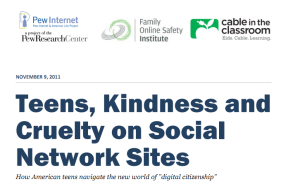Teens, Kindness and Cruelty on Social Network sites : report
Pew Report download http://pewinternet.org/~/media//Files/Reports/2011/PIP_Teens_Kindness_Cruelty_SNS_Report_Nov_2011_FINAL_110711.pdf
Comment : This is a US report but based on work I have seen from the EU - I would say that there is a high degree of alignment - I still worry that we believe we can teach the screenagers where in fact they are teaching us. We are observing and they are changing faster than we can monitor.....
The majority of social media-using teens say their peers are mostly kind to one another on social network sites.
Their views are less positive than those of social media-using adults. Most American teens who use social media say that in their experience, people their age are mostly kind
to one another on social network sites. Overall, 69% of social media-using teens think that peers are mostly kind to each other on social network sites. Another 20% say that peers are mostly unkind, while 11% volunteered that “it depends.” At the same time, in a similar question asked of adults 18 and older, 85% of social media-using adults reported that people are mostly kind to one another on social networksites, while just 5% felt that people are mostly unkind.
88% of social media-using teens have witnessed other people be mean or cruel on social network sites
15% of social media-using teens say they have been the target of online meanness
More teens report positive personal outcomes than negative ones from interactions on social network sites: 78% report at least one good outcome and 41% report at least one negative outcome
19% of teens have been bullied online, by text, or by phone.
How do people respond to mean behavior online?
Teens say they most often see people ignoring cruelty, but a substantial number have witnessed others standing up for victims.
A majority of teens say their own reaction has been to ignore mean behavior when they see it on social media.
Two-thirds of teens who have witnessed online cruelty have also witnessed others joining in – and 21% say they have also joined in the harassment
Teens rely most heavily on parents and peers for advice about online behavior and coping with challenging experiences
Most of these exchanges happening on social network sites are not taking place in full public view, as the majority of teens take various steps to manage their privacy online
55% of all online teens say they have decided not to post content that might reflect poorly on them in the future.
A notable number of teens also engage in online practices that may have the potential to compromise their safety online
Most parents of teens talk with their child or use non-technical measures to manage their teens’ online experiences
39% of all parents of teens have connected to their child on a social network site, but that does not necessarily prevent online trouble for the teen.
